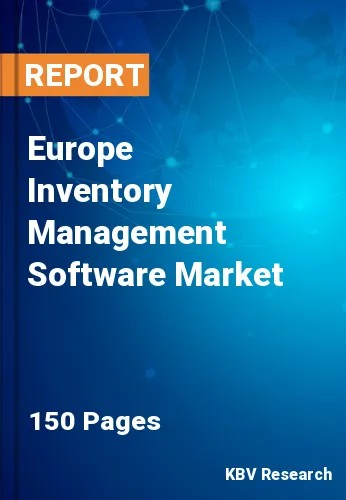The Europe Inventory Management Software Market would witness market growth of 11.0% CAGR during the forecast period (2023-2030).
The retail sector has witnessed a transformative impact by adopting IMS. Retailers face the challenge of managing diverse products, handling seasonality, and ensuring optimal stock levels. IMS facilitates real-time tracking, demand forecasting, and automated reorder points, enabling retailers to maintain a competitive edge by preventing stockouts and overstock situations. IMS aids manufacturers in monitoring raw materials, work-in-progress, and finished goods, ensuring a streamlined production process. The software integrates with other enterprise systems, providing a holistic view of the supply chain and allowing manufacturers to identify bottlenecks and optimize workflows.
E-commerce giants and small online businesses leverage IMS to handle the intricacies of inventory across multiple channels. With features like order tracking, centralized inventory control, and real-time synchronization, e-commerce businesses can efficiently manage their stock, prevent overselling, and enhance customer satisfaction through accurate and timely order fulfillment. In the healthcare sector, inventory mismanagement can have severe consequences. IMS in healthcare ensures the availability of medical supplies, drugs, and equipment, minimizing the risk of stockouts and expired products. This is particularly crucial in hospitals and clinics where timely access to supplies is a matter of life and death.
According to the UK Government, with its highly linked supply chains and substantial demand for UK-built cars throughout the region, the European region has benefited the U.K. automotive sector with its varied products, encompassing volume, premium, and niche vehicles. The automotive sector in the UK is witnessing a surge in production demands, driven by factors such as increased consumer demand, technological advancements, and a growing emphasis on electric vehicles. According to ITA, in Spain, e-commerce consumers reached 30 million in 2021. Internet penetration is 83%, while eCommerce penetration is 63%. The number of eCommerce users is predicted to increase by 25% to 37 million by 2025. All these factors will uplift the regional market’s expansion in the coming years.
The Germany market dominated the Europe Inventory Management Software Market by Country in 2022 and would continue to be a dominant market till 2030; thereby, achieving a market value of $313.7 million by 2030. The UK market is exhibiting a CAGR of 10.1% during (2023 - 2030). Additionally, The France market would experience a CAGR of 11.8% during (2023 - 2030).
Based on Enterprise Type, the market is segmented into Large Enterprises, and Small & Medium Enterprises (SMEs). Based on Deployment, the market is segmented into On-premises, and Cloud. Based on End-use, the market is segmented into Manufacturing, Retail & Consumer Goods, Automotive, Energy & Utilities, Healthcare, and Others. Based on Application, the market is segmented into Inventory Control & Tracking, Order Management, Asset Management, Scanning & Barcoding, and Others. Based on countries, the market is segmented into Germany, UK, France, Russia, Spain, Italy, and Rest of Europe.
Free Valuable Insights: The Global Inventory Management Software Market will Hit $4.7 Billion by 2030, at a CAGR of 11.2%
The market research report covers the analysis of key stake holders of the market. Key companies profiled in the report include Zoho Corporation Pvt. Ltd., IBM Corporation, Oracle Corporation, Lightspeed Commerce Inc., CIN7 Limited, Linnworks, Intuit Inc., Acumatica, Inc., Fishbowl Inventory and Brightpearl (Sage Group plc).
By Enterprise Type
By Deployment
By End-use
By Application
By Country
Our team of dedicated experts can provide you with attractive expansion opportunities for your business.

